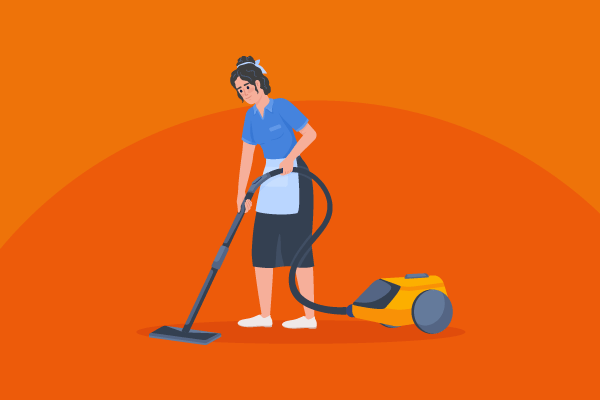
If you’re an independent cleaner, or you run your own house-cleaning company, you need the right insurance. Without it, a minor slip-up could cause a major mess. It could even clean you out completely.
So, do house cleaners need insurance? What insurance is required for house cleaners? Why? And what does it cover?
What insurance policies do house cleaners need?
Whether you’re looking for maids’ insurance or housekeepers’ insurance, most residential cleaners typically need:
- General liability insurance
- Tools and equipment insurance
- Workers’ compensation insurance (if you employ anyone).
Then, depending on the way you run your business, you might also want to add cyber insurance to your house cleaning insurance.
General liability insurance for house cleaners
Your line of work means you’re in and out of peoples’ homes, handling their prized (and sometimes pricey) possessions. And however careful you are, accidents happen.
So, it’s no surprise that it’s common to be hit by an insurance claim when house cleaning.
But we’re not just talking about breakages and damage caused by spills and drips here. Because wet floors are unavoidable in the residential cleaning industry, we’re talking about the risk of slips, trips, and falls.
Now, the average slip and fall settlement is between $10,000 and $50,000, but they can cost a lot more. In fact, a recent slip and fall claim would have cost one of our customers over $105,000 to settle.
Luckily, he had a general liability policy, which took care of it.
Of course, there are ways to reduce the risk of claims like these. And we’ve created a handy factsheet you can download to help you do this.
But the best protection for your business and your bank balance is general liability insurance.
What does cleaners’ general liability insurance cover?
General liability insurance for residential cleaning businesses can cover the cost of legal claims for:
- Property damage
- Bodily injury
- Personal injury (slander or libel).
Imagine a client slips and falls on your freshly mopped floor, or trips over your vacuum cord and breaks a leg. Without general liability insurance, you’d have to pay their medical bills. And legal costs, if they sue.
Or you knock a client’s antique vase off a side table onto the floor and it shatters. Without general liability insurance you’ll have to pay to replace it.
And what if a particularly tricky client overhears one of your employees saying something not-so-nice about them? You could be sued for personal injury. Without insurance, you’ll have to pay legal costs and damages, too, if the case doesn’t go your way.
If someone makes a claim against you for injury to themselves or their property, general liability insurance can pay medical bills, repairs or replacement costs, and legal fees, regardless of fault. But if it turns out you’re liable, it can pay compensation too.
Tools and equipment insurance
General liability insurance doesn’t cover your own property. So if you take your own house cleaning equipment to jobs, you’ll want to add tools and equipment insurance to your insurance package.
It replaces your equipment if it’s stolen or lost and means you don’t have to delay or cancel jobs. It can even cover expensive equipment, like floor machines, rented equipment, and more.
Workers’ compensation insurance
If you don’t have any employees, you can skip this one. But if you do – even if you only employ one person – you need workers’ compensation insurance. It’s required by law in most states.
Check your state’s requirements, because penalties and fines can be severe. But a workers’ comp policy is definitely worth having anyway, because it protects you from the cost of employees’ workplace injuries.
If one of your staff is hurt or falls ill as a result of working for you, workers’ compensation insurance can pay their medical bills and replace missed wages. What’s more, it can cover the legal costs and compensation if they sue.
Cyber insurance
Now you might think a house cleaning business doesn’t need cyber insurance. But if you have a website and use email, you’re a target for hackers. Especially, if you take bookings or payments online.
One wrong click on an email is all it takes. Next thing you know you’ve transferred money to fraudsters. Or they’ve diverted your clients’ payments.
A cyber policy means you can click with confidence. If you get hacked, or defrauded, you’ll have an award-winning response team ready to help you deal with the attack. And the cash to get you up and running again in no time.
Do I need insurance if I work for a house cleaning company?
If you’re employed by a residential cleaning firm, you’re probably already covered. But it’s worth checking.
As well as being sure your employer has workers’ compensation insurance, you want to check exactly what else you’re covered for.
Do you use your own cleaning equipment on jobs, for example? If so, find out if it’s covered on your employer’s policy. If not, you’ll need to insure it yourself.
House cleaning insurance quotes online
Still not sure what cleaning business insurance you need? Wondering if there are any differences between residential housekeeping insurance and apartment cleaning insurance?
Our team is here to answer any questions you have. Call us at 978.344.4215. Or if you’re all set, get a quote online now.
cleanerscyber insurancedomestic and residential cleaninggeneral liabilityjanitorstools and equipment insuranceworkers' comp insurance